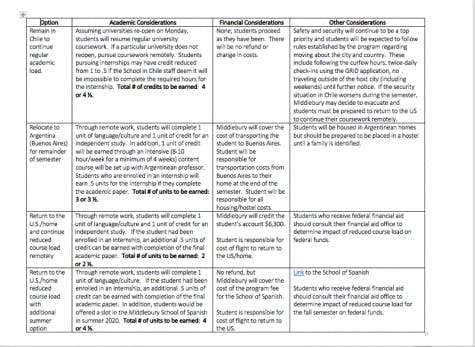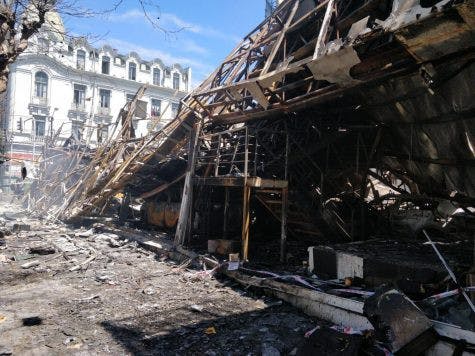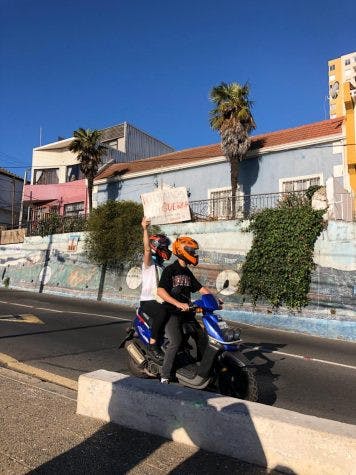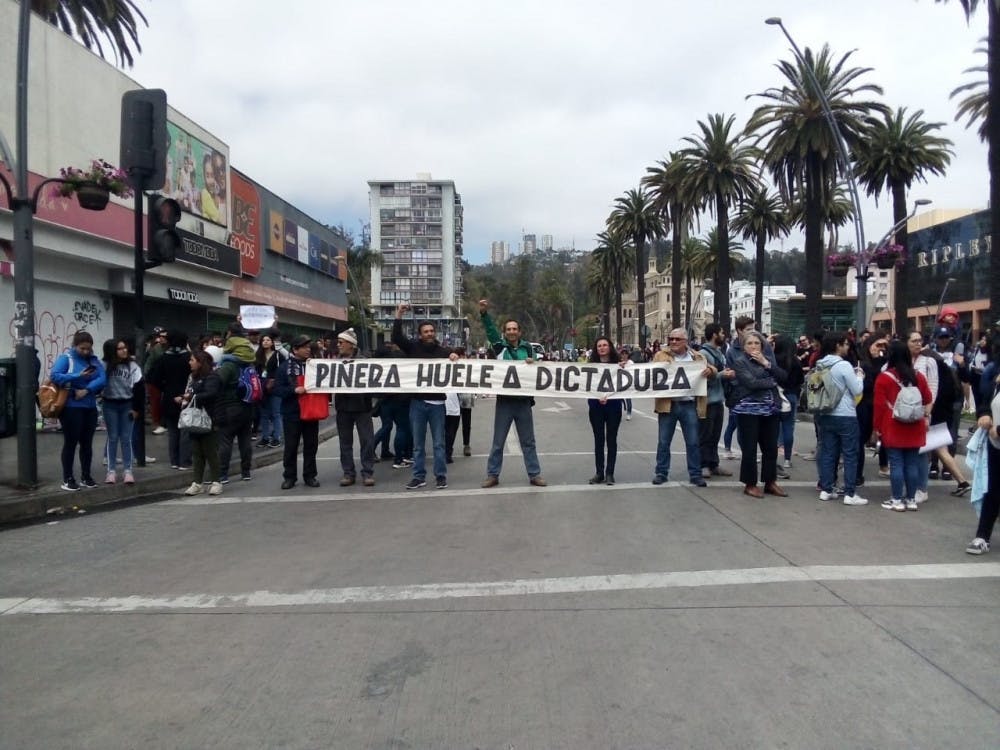UPDATE: Thursday, Oct. 24, 6:45 p.m.
Rather than evacuating all students enrolled in its schools abroad in Chile, Middlebury’s study abroad office is allowing students to choose how to proceed.
In an email to students enrolled in the programs in Chile, Assistant Director of International Programs Alessandra Capossela outlined four options students may take going forward. Students can either choose to remain in their host cities and await universities resuming class; relocate to Buenos Aires, Argentina for the remainder of the semester; or can return home to the U.S.
If they return to the U.S., they have the option to complete coursework remotely for up to 2.5 credits, or can earn up to 4.5 credits by adding a course of summer study with the Middlebury School of Spanish.
“We spoke with Global Rescue this morning and our advisors there confirmed that the situation was stable for the time being, with some slight improvements in that curfew hours are being shortened in a number of cities,” Capossela wrote in the email. “[Schools in Chile Director] Juan [Pastene] is cautiously optimistic that many of the universities will reopen on Monday.”
In her email, Capossela asked that students make a decision by next Friday, November 1.

——
Oct. 23, 2019
Middlebury’s study abroad office is considering evacuating students enrolled in its programs in Chile in response to widespread civil unrest and government attacks on protesters that have recently swept the country.
Currently, 23 students from Middlebury and other colleges are enrolled in the C.V. Starr Schools Abroad there, located in Concepción, La Serena, Santiago, Temuco, Valdivia, and sister cities Valparaíso and Viña del Mar. Most students in Middlebury programs are located in the capital city of Santiago and the sister cities, where protests erupted at the end of last week after a hike in public transportation fares.
The hike was later revoked by President Sebastián Piñera, but protesters declared on social media that the increased fees were only the “tip of the iceberg,” and have demanded change in wealth inequality, government corruption and high cost-of living — conditions many see as remnants of Augusto Pinochet’s 1970s dictatorship.
The Chilean government declared a state of emergency in some cities, including Valparaíso and Santiago, on Saturday. Members of the police and military have since attacked and detained protestors, shooting at them with rubber and live bullets and throwing tear gas bombs.
Assistant Director of International Programs Alessandra Capossela, who advises for the college’s schools in Chile, alerted students enrolled in the programs on Tuesday via email that the college’s study abroad office is developing plans for a possible evacuation “should things not improve in the next few days.” But even if the protests did quiet down, she wrote, it would be doubtful students could eventually return to their classrooms, given potential for longer-term university closures and student strikes.

A burnt building in Valparaíso.
In an email to The Campus, Capossela wrote that the study abroad office is considering “all possibilities for the program in Chile going forward, including but not exclusively an evacuation of the students.” Any plan that is implemented will apply to all students enrolled in the Middlebury program regardless of their home institutions, Capossela wrote.
If students are evacuated, they will be flown to Buenos Aires, Argentina or a city in the United States, likely Miami. From there, they will take flights to their home cities. Global Rescue, the study abroad program’s security adviser, is working on an evacuation plan for students and will be in charge of all operations in the event of an evacuation, according to the email sent to students in the program.
In that email, Capossela wrote that her office is exploring “alternative solutions” to earn academic credit, so that students can earn credit even if an evacuation takes place.
Still, some students expressed frustration at the possibility of leaving the country.
“I can’t speak for everyone, but we feel relatively safe and want to continue learning from this experience, even if it’s not a traditional semester abroad,” said Sidra Pierson ’21, who is enrolled at the Catholic University of Valparaíso and living in a homestay in Viña del Mar.
According to Mason Arndt ’21, who is attending the same university and also living in a homestay in Viña del Mar, students in the sister cities have created a petition asking to remain in Chile. Eleven of the 12 students in those cities have signed the petition. Arndt was the only student who chose not to sign, saying that though he has had a positive experience in Chile, he doesn’t believe strongly enough to sign that staying is the right move.
“If they decide to send us home I would definitely be sad because I’d feel like I’d be losing a valuable experience, but for me it wouldn’t be the worst thing in the world,” he said.

Valparaíso sits on Chile's coast, about 60 miles from the capital city of Santiago.
In Chile, students in Middlebury programs have observed — either firsthand or through accounts by Chilean acquaintances — looting of stores by protesters, violent government response to protests and other signs of unrest over the past several days. Looting, arson and other violent tactics used by some protesters have created some conflict within the movement between those who do and do not condone the use of violent protest tactics.
Protests in Valparaíso and Santiago have significantly altered the course of students’ semesters. Some Middlebury students in Valparaíso had already missed substantial class time due to student strikes at universities that forced classes to start in September rather than mid-July. Classes at the Middlebury programs’ host universities were again cancelled this week when this round of protests began. Students have been told to remain indoors at all times in the face of various curfews put in place in major cities.
A 6 p.m. curfew was put into effect in Viña del Mar on Monday. Before then, beginning on Saturday, it was set to 8 p.m., Arndt said. With major cities under martial law, the Chilean military has repeatedly shot people for staying out past curfew.
Arndt saw protesters lighting trash cans on fire in the street outside his apartment window on Saturday night. One man threw a brick through the window of a pharmacy across the street, and protesters proceeded to steal items from the store. Later, Arndt watched police arrive and dispel the protesters, who were out past curfew, with batons and tear gas.
“It feels a bit apocalyptic,” Arndt said.

Protesters on a motorized scooter carried a sign declaring “we are not at war,” a slogan meant to capture the one-sidedness of clashes between Chilean military personnel and protesters.
Over the weekend, Pierson said she tried to visit a friend’s homestay in the late afternoon, only to be turned around by a line of police officers advancing down a street and throwing tear gas at a throng of protesters.
“When I left my house, you could taste the smoke in the air,” Pierson said. “People were setting fires everywhere.”
Arndt understands the protestors’ cause, but he and other students have largely assumed roles as observers.
“It's easy to be empathetic in terms of the high inequality and the high cost of living,” Arndt said. “But it's really impossible for us to understand what it's like to live in a country like this that had a dictator.”
The program’s students have been told not to join protests in light of the violence, as well as for fear of possible deportation if they are caught. But the consequences of the protests and government response will not affect them nearly as severely as they affect Chileans, Pierson said.
"The way this is going to affect us is probably not going to reach far beyond our academics for one semester," she said. "It’s a pretty in-your-face reminder of our privilege and status as foreigners here. Chileans can’t just up and leave, this is their reality.”
Last year, students studying at the C.V. Starr school in Yaoundé, Cameroon were evacuated as a precaution following contentious presidential elections. That evacuation, to Morocco, was temporary.
This is a developing story and will be updated accordingly.
Update: Study abroad office opts against mandatory evacuation of programs in Chile, offers students options

COURTESY OF MASON ARNDT
Protesters carrying a banner bearing the slogan “Piñera smells like dictatorship” gathered in Valparaíso, Chile Wednesday morning.
Protesters carrying a banner bearing the slogan “Piñera smells like dictatorship” gathered in Valparaíso, Chile Wednesday morning.
An email sent to students on Oct. 24 outlined four potential options for continuing with the remainder of the semester.
COURTESY OF DAN SCALL
COURTESY OF EMMA JACOBS
COURTESY OF JHENNA EL-SAWAF
Comments



